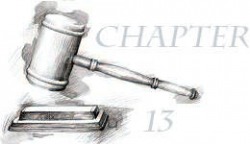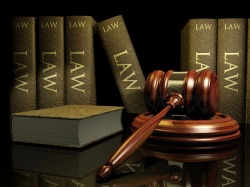“Chapter 13 bankruptcy is generally known as bankruptcy for the working individual. It allocates the debtor to repay part of the debts owed through creating a budget and allot surplus money to creditors. However one question in hunting how to file for chapter 13 bankruptcies”  Filing for chapter 13 bankruptcies is rather simple, although the activity requires a bankruptcy attorney due to the complexity of the bankruptcy laws. Some of those reasons which include having a more positive credit report, and the feeling that they are repaying the debts they owe. Get together all information on debts. This includes turning credit accounts for instance credit cards or else medical bills, credit involving capital for example a house or car note, in addition to taxes owed to the state or federal government. Additionally bring all along any court documents if somebody is suing for money. Rule out all additional alternatives. Credit counseling organization could at times decrease payments to a reasonable level. Filing chapter 13 bankruptcies has a much lasting effect on credit rating, and the decision to file must be considered an absolute last resort s all other alternatives fail. Meet up with an attorney. Get an attorney which specializes in bankruptcy, either with referral or through just searching for the phone book. Chapter 13 bankruptcy is complex, and appointing an attorney who knows all the facts to file is absolutely necessary. Work out a budget. Generally a paralegal at the attorney's office or the attorney would go over living expenditure, in addition to all debts which can't be discharged, for example back taxes. They would settle on how much revolving creditors would receive. Obtain a credential from a credit counseling agency. This is necessary prior to you file for bankruptcy could be finalized. All the agency does is take present earnings and present minimum payments and living expenditure to show it's not possible to make payments. File an action in bankruptcy court. The attorney would file the motion. There is a fee because of the court as bankruptcy is filed, so make sure through the attorney.
As you file chapter 13 bankruptcy, you don’t need to worry about your creditors harassing you by phone calls and letters any more. By law, as you file bankruptcy, creditors are officially prohibited from contacting you.
 Times have changed drastically. People want to just enjoy the present and leave the tensions for some time in the future. Earlier people used to consider bankruptcy as stigma and would try their best to avert it. On the contrary, nowadays, if the debtor knows that the debt is not going to be paid off, despite regular payment for life, the debtors goes for increasing the debt and finally when there is no way to get rid of the debt, files for bankruptcy. Seeking online bankruptcy advice is nowadays common, thanks to the recession. For many the logic is absolutely different. Some say that they never wanted to file for bankruptcy but were forced to do so. They justify their stand claiming that bankruptcy has been an uninvited guest in their life, and so it is the bankruptcy that should be ashamed and not the bankrupt. What they fail to realize is that the debt worsened just because of the attitude of the borrower. Before filing for bankruptcy one should take online bankruptcy advice from a reputed and experienced bankruptcy professional. One should try to know in details about the formalities to be complied with to get the approval of the bankruptcy from the bankruptcy court. The approval of the majority of the cases relies on the presentation and pleading by the attorney on the behalf of the debtor. In most of the websites of the companies offering bankruptcy services there is a special page pertaining to the FAQs. Usually the FAQs try to include as many questions as possible. One should thoroughly go through the chapter 7 bankruptcy FAQ before filing for bankruptcy. Chapter 13 bankruptcy is completely different from chapter 7 bankruptcy. While chapter 7 bankruptcy offers instant discharge from the debt, the chapter 13 bankruptcy plan allows the debtor to get rid of the debt over an extended period of time. It is not only individuals that can file for bankruptcy, but business identities can also file for bankruptcy. This depends on the magnitude of financial crisis that the business is undergoing. Business identities can file for bankruptcy through chapter 11 bankruptcy filings.
Filing bankruptcy is not at all a shameful act, but the actions of the debtor that have led to the financial catastrophe are shameful. A person should be wise enough to avail online bankruptcy advice and not repeat those shameful acts.
 Are you considering using a bankruptcy service? Bankruptcy is a Federal process that, through a group of laws, protects consumers and permits consumers’ unsecured debts to be forgiven or paid back in a managed way. Chapter 13 and Chapter 7 Personal Bankruptcy Laws recognize that bad circumstances can sometimes befall good people, despite their income, many times through no failing on their part (i.e. hospital emergencies or employment loss), and consumers oft times just do not have the means to satisfy a creditor's payment demands. After a consumer files for bankruptcy using a bankruptcy service (attorney), an Automatic Stay is immediately put into action, which in accordance with Chapter 13 and Chapter 7 Personal Bankruptcy Laws forces any of your creditors to cease collection action. The Automatic Stay immediately compels your creditors to desist from phoning to harass you, halts collection letters from being mailed to you, and also halts any bank levies, current or pending, wage garnishments, lawsuits, and other types of harassment by creditors. Chapter 13 and Chapter 7 Personal Bankruptcy Laws Chapter 13 Bankruptcy and Chapter 7 Bankruptcy are the most popular ways for consumers to file for bankruptcy protection via a bankruptcy service; Chapter 7 bankruptcy is by far the most popular. It allows Americans to completely discharge their debts through a relatively quick chapter 7 bankruptcy process managed by the consumer’s personal bankruptcy service. Chapter 13 bankruptcy is fundamentally a debt consolidation program. By the use of a personal bankruptcy attorney, a Chapter 13 bankruptcy will allow the consumer to retain their home and vehicles and to repay all or a portion of their creditors over a few years. After chapter 13 bankruptcy, the bankruptcy will be discharged. Chapter 13 and Chapter 7 Personal Bankruptcy Laws require that the bankruptcy court deliver to the consumer a Discharge notice as soon as the bankruptcy has been effectively completed.
 A chapter 7 bankruptcy or just filing for personal bankruptcy is one of the hardest things a person ever has to deal with. The decision to file for bankruptcy is a difficult one but often one made out of necessity where there’s really no alternative. Is there any way for you to actually avoid bankruptcy? While everyone has their own point of view on bankruptcy, it is quite often the only realistic solution some individuals and families have at their disposal. So, what do you do when you are finally at the point of being bankrupt and what options do you have at this point?
A lot of individuals that are thinking about a chapter 13 bankruptcy have already tried their luck at getting consolidations, loans, settlements, and other ways of attempting to remove or reduce their debt. Bankruptcy very well could be the only option. Most of those who need to deal with chapter 11 bankruptcy filings are not even capable of affording to pay off the minimum balances on their outstanding credit cards, home mortgages and even their auto financing payments. Whatever has got someone to the point of being bankrupt doesn't even matter. For those individuals that know that a file for bankruptcy is going to be their only solution, they really need to find themselves a bankruptcy lawyer in order to help them with their bankruptcy proceedings. This is because the laws for bankruptcy in each state are a bit different and confusing. Each individual state has its own bankruptcy requirements and options. Not to mention that these bankruptcy laws are always in the process of changing. So it is critical that you would find yourself a bankruptcy attorney that can help you find your way out of your current predicament. While a lot of the time it is just a simple matter of showing your proof of income and debt, other chapter 7 bankruptcy cases will involve the loss of some of your valuable possessions and goods also. It is also important to remember that a bankruptcy can be left on your credit report for up to ten years. The decision to file for bankruptcy is something that can have an impact on your entire way of life so it is wise for you to engage with a bankruptcy lawyer before deciding on doing anything. More....
 A Chapter 7 bankruptcy is by far the most popular type of bankruptcy. Chapter 7 offers American consumers the chance to emerge out of a financial crisis and to wipe the slate clean their debts through a relatively swift chapter 7 bankruptcy process organized by professional consumer bankruptcy attorneys. More than 65% of all bankruptcies are Chapter 7. Chapter 7 bankruptcy is the preferred bankruptcy method for many debtors that have little or no real assets to loose, because with a Chapter 7 bankruptcy, all of the non-exempted property of the consumer is sold and the proceeds are distributed to the creditors. Therefore, if the consumer has no real assets to loose, then Chapter 7 bankruptcy is a quick, easy, clean way to start out anew.
How to File Chapter 7 Bankruptcy To begin with, the bankruptcy court will appoint a Chapter 7 bankruptcy trustees. The trustee will find and collect any non-exempt property/assets from the debtor. The trustee will sell the debtor’s non-exempt property/assets and the revenue from the sale will be distributed to all of the creditors. The debtor does not pay any money to the trustee. If the debtor has no assets or non-exempt property, then the trustee will not conduct a sale. Does Chapter 7 Bankruptcy Mean You Will Loose Your Home or Automobile? One great benefit of filing for a chapter 13 bankruptcy, or a chapter 7 bankruptcy for that matter, is that you can immediately sign a reaffirmation agreement, allowing you to keep your home and your car. The reaffirmation agreement allows the consumer to continue to pay their mortgage company and/or their automobile finance company just as they did before the bankruptcy. The reaffirmation agreement is actually part of the United States Bankruptcy Code and allows the consumer to keep some or all of their property. With a Chapter 7 personal Bankruptcy attorney, the consumer debtor will receive a discharge on all their dischargeable debts. Once a debt is discharged, the creditor or collection agency has no legal right to pursue the consumer for any reason relating to the discharged debt and has no recourse to try and collect a debt that has been discharged. More...
If you find your business is in financial trouble, how do you figure out whether you should file business bankruptcy? Ask yourself several questions: Is the business a corporation, partnership or proprietorship? Corporations and partnerships are legal entities separate from their shareholders or partners, and can file Chapter 7 or Chapter 11 bankruptcy on their own. Be cognizant that in a partnership's Chapter 7 business bankruptcy, the trustee can sue the general partners of the partnership if the partnership's assets are insufficient to pay partnership debts. Partners may be facing a suit by a well-funded trustee suing for the benefit of all creditors of the partnership. Get sound advice before moving ahead on a partnership bankruptcy. It’s important to know your business bankruptcy options. Proprietorships are just an extension of the owner and can't file small business bankruptcy alone (no separate legal entity). The proprietor, who is the owner, must file the personal bankruptcy, as the property and debts of the business are really just one form of assets owned by the proprietor. The individual business owner may file a Chapter 7, Chapter 11 or Chapter 13 bankruptcy (if the debt limits are met). SHOULD THE BUSINESS BE REORGANIZED OR LIQUIDATED? To answer this question, you have to know what has caused the problems the business. What reorganization can do is: - Free up cash from paying old debts to use currently;
- Enable debtors to negate leases or contracts that are no longer working for them
- Immediately stop company assets (or cash) going to creditor collection actions.
Between Chapter 7 liquidation bankruptcy and reorganization, a Chapter 13 or Chapter 11 bankruptcy could provide space to sell as a going concern or push off assets. The profit could pay taxes or unpaid salaries. This can be complex and should be reviewed with a bankruptcy attorney. The corporate bankruptcy could then be converted to a Chapter 7 business bankruptcy, or dismissed if protection is no longer needed. The court will most likely have the business bankruptcy debtor pay creditors from sale profits. Small business bankruptcy can be hard for an already hurting business. The legal expenses are costly. Most reorganizations fail, usually for lack of a workable plan to solve the underlying business problems. Businesses with little capital, have few assets, or are extensions of the owner are ones that it may not pay to reorganize. The owners may be better off liquidating the business and starting over. Chapter 7 may be the best choice when: - The business has no future
- There are no substantial assets
- The debts are overwhelming
A Chapter 7 personal bankruptcy can often provide an s corporation or c corporation (or even LLC's) with an orderly liquidation. You should check if this is applicable when filing bankruptcy for medical bills. Deciding whether to file business bankruptcy is appropriate for your company may be one of the most difficult decisions you'll ever make. Know all your business bankruptcy options More....
In the United States, there are no medical bankruptcy laws or formal medical bankruptcy rules. However, thousands of Americans are filing bankruptcy attorney for medical bills. Recent studies by Harvard and Ohio State show that just over 60% of personal bankruptcies filed even before the current “financial crisis” were due to medical bills. This finding was widely suspected by those familiar with the country’s bankruptcy system, but never before had it been confirmed. With there being no medical bankruptcy laws or medical bankruptcy rules, it is important to understand what your options are. The first thing to know is all medical bills are eligible for either a debt discharge or debt restructuring under both Chapter 7 bankruptcy and Chapter 13 bankruptcy laws. Filing bankruptcy for medical bills is a workable and proven way of dealing with excessive medical bills. To many this can be disturbing, but the legal consequences of not being able to pay them can be avoided through bankruptcy. Most people understand the purpose of bankruptcy is to discharge debts and in today’s economy there are no higher and more unattainable charges than the countries out of control medical charges. Until a more permanent solution can be found through Federal legislation, one of the few alternatives of dealing with totally unworkable charges is filing bankruptcy for medical bills. In many ways this is a sad commentary on the state of the country. The US is the only advanced industrial country that puts its population in this difficult position of having no alternative when dealing with medical costs. Anyone facing serious medical bills needs to be fully aware that filing bankruptcy for medical bills is both a legal and ethical option that is open to them. While the US may not have medical bankruptcy laws, it does have a reasonably functioning bankruptcy system and it should be used by those who need relief by their filing bankruptcy for medical bills. More...
Filing bankruptcy for medical bills accounts for nearly two out of three bankruptcies, even people with health insurance face financial disaster if they experience a serious illness, a new study shows. The study data likely understates the full scope of the bankruptcy medical debt problem because the data were collected before the current economic crisis. In 2007, filing bankruptcy for medical bills contributed to 62.1 percent of all bankruptcies. Between 2001 and 2007, the proportion of all bankruptcies attributable to bankruptcy medical debt rose by about 50 percent. “The U.S. health care financing system is broken, and not only for the poor and uninsured,” the study authors wrote. “Middle-class families frequently collapse under the strain of a health care system that treats physical wounds, but often inflicts fiscal ones.” The data on bankruptcy medical bills, compiled by researchers at Harvard Law School, Harvard Medical School and Ohio University, is based on a survey of 2,314 randomly selected bankruptcy Attorneys filers. Among families who were bankrupted by illness, those with private insurance reported average medical bills of $17,749 compared to those who were uninsured, who faced an average of $26,971 in medical costs. Those who had health insurance but lost it in the course of their illness reported average medical bills of $22,568. Hospital costs accounted for about half the expenses (48 percent), followed by prescription drugs (18.6 percent), doctor’s bills (15.1 percent) and insurance premiums (4.1 percent). Medical equipment and nursing home care rounded out the list. The health problems that left patients with the highest out-of-pocket expenses were ranked as follows: Neurologic (i.e., multiple sclerosis): $34,167
Diabetes: $26,971
Injuries: 25,096
Stroke: $23,380
Mental illnesses: $23,178
Heart disease: $21,955 Bankruptcyonly provide complete information on legal largest bankruptcy attorneys that it help to filing bankruptcy attorney, with u can stop medical bills, chapter 7, chapter 13 bankruptcy foreclosure and help to rebuild your credit. More....
|







 RSS Feed
RSS Feed